Geoff passed his precious photos to me at a Disorganised Lunch. Very trusting of him! There are lots, so I’m not going to caption them.
Enjoy!
Click an image to get the gallery going….
Geoff passed his precious photos to me at a Disorganised Lunch. Very trusting of him! There are lots, so I’m not going to caption them.
Enjoy!
Click an image to get the gallery going….
I recently read the article here “Clive Leighton – his working life” and was absolutely fascinated by the similarities in our respective BBC backgrounds…..although it actually goes back even further in that we were both born the same year and both experienced similar aspects of WWII.
I lived with my shopkeeping parents just off Baker Street in London. During that time, after spending nearly two years as an evacuee in Oxfordshire, I returned to London. Bombs were still falling and my father, who was part of the local fire-watching team, sometimes got me to do his shifts for him. At that age it seemed all rather fun because the possibility of being blown to bits didn’t really seem real. I also recall on one occasion a land mine exploding quite close by which blew out the windows of the two adjoining shops either side but left ours totally unscathed. Just the way the pressure wave went. The one owner of both shops either side was cursing like a trooper the following morning as he swept up all his broken glass and looking daggers at our untouched shop front.
I also recall walking along Oxford Street when a V1 buzz-bomb (doodle bug) went spluttering low over the roof tops with a Spitfire running alongside waiting to reach open space (Regent’s Park was en route) before he tipped it over with his wing-tip hopefully before it stopped on in own accord and exploded in such a heavily built-up area. Those pilots were amazing.
After the war my parents kept the shop but bought a residential property in Westcliff-on-Sea so we became commuters until I was 18 and called up into the RAF for National Service. Just like Clive, and many others I’ll warrant, we were all asked what trade we would like to select…. which had no bearing on where we ended up. The fact is whatever they were short of at the time was where you were sent (I later discovered the BBC adopted the same selection process). I was half-way lucky in choosing radio operation and was sent to AGRS in Yatesbury, Wiltshire but to be trained as a radar operator (well, it could have been a cook or an office-walla -just the way the cookie crumbled).
After trade training I opted for an overseas posting. Needless to say the closest I got over any sea was the North one at Felixstowe in Suffolk from where we were ‘garried’ in daily to the radar station at nearby Trimley Heath.
And how is this for yet another coincidence. Many of you London-area tech-ops bods will know Paul Kay. We now live quite close and recently discovered, by chance, that we both did our National Service at that same station at the same time. He was in radio and I was in radar. Further, whilst I was there I was also a member of the station band (drummer) and quite recently I got a telephone call out of the blue from another ex-bandsman who had tracked me down. We recently had a reunion and, brother, did the memories flood back although, now in my dotage, by the time I manage half way up the stairs, I have totally forgotten why I am there!
At my BBC interview I opted for the new burgeoning television service as a cameraman and showed them plenty of my most ravishing box-brownie photographs to reinforce the application so naturally was instead sent to Bush House World Service radio division as a control room engineer trainee. Oddly enough one of our demobbed RAF station officers was also working there on production. They say, if you stand in Piccadilly Circus long enough you will eventually see everyone you have ever met, known and wish to have known. I say, if you can just remain standing up long enough the same applies!
OK. I quite enjoyed it at Bush but listening to the news in forty languages was not my ideal except very occasionally one of the language services would put on a short jazz programme.
I recall Humphrey Littleton’s band in the studio on one occasion. Four shifts system over 24 hours, four days, four mornings, four nights and four days off…..well only three and a half really because the first day off was sleeping after a night shift. Clive mentioned that as a grams op he would have to check the turntables (as did we in each studio) and the record used for that was a 78 rpm “Teddy Bear’s Picnic”. I always thought that choice was peculiar to Bush House. Gosh, did THAT bring back memories. As I recall the flip side was entitled “Hush, hush, hush, here comes the bogey man” or something similar. Whoever dreamed up that record for grams checks?
It was at this time, after my father had died and my mother sold the Westcliff property, that we moved into a flat in Tottenham Court Road. Normally I would drive to Bush House but there was one day when it wasn’t possible, the roads were blocked off in most of central London, however it wasn’t all that far for me to walk. I knew the television service was largely encamped in Trafalgar Square to cover the Queen’s coronation down the road in Westminster Abbey, the Square was indeed covered with broadcasting vehicle of all types, radio, television and foreign broadcasters. As it was on my way to Bush House and I had a pass I stopped off to watch all the frenzied activity, popped in to a scanner for a while, and so wished I was part of it.
As I continued walking along I saw placards announcing Edmund Hilary (later Sir) had conquered Everest. What a momentous day although for my part I was designated to man the Italian service continuity suite and so heard all the ceremony in Italian…non capito!
I was sent on attachment for a few months to Radio OBs. Again I was fascinated with this new type of operation, setting up temporary control rooms and placing mics. All live. Being a musician myself I would particularly like covering variety shows. dance bands and concerts from theatres, ballrooms and hotels. On one occasion a featured American songstress who may have been perhaps five years my senior (so old!) made a very obvious play for me as I was packing up the gear when the broadcast was over and invited me to her hotel room for a ‘drink’ . I was a young, good looking Jack-the-Lad in those days and considered myself way above being classified in my own mind as an older woman’s play thing so I declined. The stupidity of youth, eh? Where is she now?….hope all is forgiven.
In due course I saw on the notice board vacancies for tech.ops TV. With indecent haste I put in my application for a board. To give the Beeb (although in my day it was referred to as ‘The Corp’) their due any member of staff, whatever their rating, position or location was entitled to apply for any advertised internal vacancy.
And so it came to pass I achieved my dearest wish. Spent some time in induction and was sent to Lime Grove for the first day of my many years in television. As I stepped hesitantly into Studio G I was immediately welcomed by the crew and given the job of swinging the Mole arm. Yes, they were so short of bods they had to put a complete first-day newbie in
such a responsible position. Some hurried pointers from the senior cameraman and we were on the air. I was in heaven. I can clearly remember the name and storyline of the programme, one of a series entitled “Nine Day Wonders”. I can also remember ogling the make-up girls and thinking ‘This is my Life’ (how many of those did I eventually do?). The year was 1952/3. Sixty years on and although my memory fails half-way up the stairs…..I am also still ogling.
At around that time ITV were granted their licences and they were desperately recruiting staff from the BBC at unheard of salaries, hence the shortage of technical staff. Where else could they get them from? I opted to stay on the premise that with all the trained staff left and leaving there would be great opportunities for rapid advancement and so it came to be. I quite quickly moved up the ladder from cable bashing to cameras 4,3,2 and even 1, usually with a change of crew each time. There were three trips to Evesham during my time there. (Now what was that secretary’s name that showed me the sunken bath at Wood Norton Hall?)
As a training ground the BBC was superb. Although I had opted for my main interest in camera operation I also enjoyed the variety of sound boom operator and grams ops on many occasions also inlay/overlay, vision mixing, etc. You name it we had the opportunities and were encouraged to do it for a vast variety of shows from children’s and women’s hours to religious programmes, interviews, major dramas and large-scale musicals. The list was endless.
So, back to my early days. I was now a fully-fledged cameraman…in name… but not all that experienced yet. I was once on the front end of a motorised crane doing a musical show in G using the then Pye Photicon Mk 1 cameras. They were very insensitive and always
operated with the iris fully open (f 1.9) so you can imagine the depth of field….and you would need a good imagination as there wasn’t any. In other words, focus was very critical. It was a Ted Heath band show with singer Dennis Lotis. Nice guy but I didn’t do him any favours. I had this long shot from the back of the studio tracking into a close up. There were no zoom lenses in those days. As we continued inexorably forward I saw the picture begin to soften and so tweaked the focus handle to compensate but somehow it never seemed to actually click in and of course it was changing all the time. Now sweating profusely I was desperately attempting to find focus right up to the close-up by which time Dennis Lotis’ face was little more than a ghostly blur…..and until I too am a ghostly blur I still shudder at the memory together with the overriding recall of the deathly silence from the gallery until the mesmerised director snapped out of it and screamed “cut to 2”. I tried to convince myself I had created a new art form and everyone was too awe-inspired to speak.
Some old wrinklies might remember HD started long before the 21st Century. In the 1950’s there was a company in Highbury called ‘High Definition Films’ They used B/W cameras modified to work on 1100 lines progressive, nearly three times the then 405 line interlaced broadcast system. The output was recorded off a special monitor on to film. They couldn’t directly transmit of course but made quite a number of productions for telecine transmission. I visited them once and it was weird to see the effect of such a high line structure. In today’s vernacular “cool”.
Over time the many experiences gave me great satisfaction and pride. Being bussed up to ‘Ally Pally’ to do the news from Studio A, levelling up the captions board with a length of string to each corner, and later on attachment to Ally Pally to man the ColourTest experiments, using the enormous Marconi modified RCA colour cameras (the coffin) that
took nearly two hours to line up prior to transmission when the B/W service shut down at night. Sometimes I also shot 35mm film for inserts. Once I was sent to Wales for a drama OB from a makeshift studio and so it went on. It was almost unheard of for a studio-based cameraman to be sent on an OB. It was strictly horses for courses in those days and ne’er the twain should meet. I did apply once for a film cameraman board but didn’t get it. In retrospect just as well.
I had ten glorious years with the Beeb, enjoyed every minute of it, especially when I WAS good enough to be called an experienced BBC cameraman and was able to prove it.
I left the maternal bosom of the Beeb to accept a much better paid job as cameraman with a new mobile facilities unit, Intertel, based firstly in Munich and later in Switzerland.
It was at that time I got married . Just before I left I happened to mention to Bryan Cowgill where I was off to and he asked me to take photographs of any sporting events we covered abroad and send them to the sports office. It sounded like a nice little extra earner but the truth is that when manning a tv camera at a sporting event there is precious little opportunity to leave it running whilst taking your own stills.
At that time we were the only such broadcast unit in Europe although there was a chemical company that ran a similar unit for their own commercial and promotional purposes and they even went to colour before the UK colour service started.. We had one large main control truck with four Marconi Mk IV cameras, racks, vision and audio control rooms and some very large cable drums attached to the outside rear. The other truck had two 2” 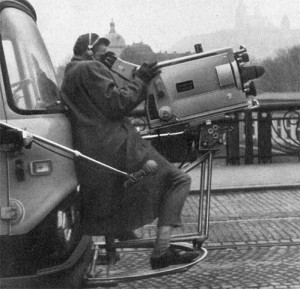 Ampex 1000 Quad recorders and associated equipment. Many boring hours checking tapes for drop-outs before use. We travelled all over Europe, both East and West covering a variety of OB’s and studio shows, musicals, doco’s, news coverage, interviews, often with well-known political and show biz personalities including Hollywood stars also TV commercials and lots of sporting events, etc. Our customers were mainly US, UK and European broadcasters. We were a mixed ‘Tower of Babel’ bunch, Americans, French, English and German and wonder of wonders, we all got screen credits on every show we did. The BBC still doesn’t credit the camera team although I have occasionally seen a credit for camera supervisor, mainly on big OB’s.
Ampex 1000 Quad recorders and associated equipment. Many boring hours checking tapes for drop-outs before use. We travelled all over Europe, both East and West covering a variety of OB’s and studio shows, musicals, doco’s, news coverage, interviews, often with well-known political and show biz personalities including Hollywood stars also TV commercials and lots of sporting events, etc. Our customers were mainly US, UK and European broadcasters. We were a mixed ‘Tower of Babel’ bunch, Americans, French, English and German and wonder of wonders, we all got screen credits on every show we did. The BBC still doesn’t credit the camera team although I have occasionally seen a credit for camera supervisor, mainly on big OB’s.
There were one or two occasions on larger shows or Olympic events when we needed more cameramen or lighting engineers and it fell to me to re-visit my old stamping grounds and convince some buddies to apply for some annual leave or DOIL’s to cover their illicit moonlighting activities. My American bosses were more than happy to know the 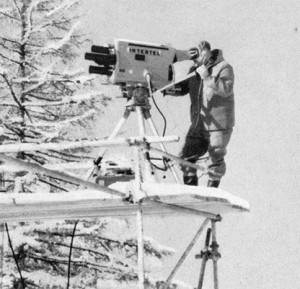 temporary people I roped in were all BBC trained. No questions were asked nor doubts expressed about their capability. No names mentioned but they are now either dead or long retired so safe from retribution, as am I. Let’s face it the BBC has always and still does have a unique quality cachet. One one occasion, as an independent and long after I had left broadcasting as a staffer, I was booked to cover an event at a Middle Eastern Ambassador’s establishment. When I arrived I was greeted not with the question “are you the video man” but it was “are you the BBC man”, and again many such times after. It was beginning to dawn on me just how much those initials meant to most people around the world.
temporary people I roped in were all BBC trained. No questions were asked nor doubts expressed about their capability. No names mentioned but they are now either dead or long retired so safe from retribution, as am I. Let’s face it the BBC has always and still does have a unique quality cachet. One one occasion, as an independent and long after I had left broadcasting as a staffer, I was booked to cover an event at a Middle Eastern Ambassador’s establishment. When I arrived I was greeted not with the question “are you the video man” but it was “are you the BBC man”, and again many such times after. It was beginning to dawn on me just how much those initials meant to most people around the world.
We had a very English sound assistant with the mobile unit. Again, right out of the blue one day not so long ago he tracked me down and telephoned from America where he has lived for many years and become a totally, avid, perhaps rabid is more accurate, ultra-dedicated US citizen and very anti Obama to boot. We agreed to keep in contact by email but instead of talking about our common experiences in Europe he just keeps on raving about his love of America and hate of their current President so communication has somewhat floundered in one direction.
In due course I returned to England and became a freelance TV cameraman. There were only two of us in the country at that time being rather unique and both kept fairly busy not only with TV stations but with an increasing number of independent production outlets serving the broadcasters. How times change. It is now difficult to find a cameraman who isn’t freelance.
It was in 1963 that I was offered a job with Vinten as a sales manager. Of course I knew well their range of camera mounting equipment, heads, dollies and cranes, etc. but in fact to them this was merely a useful addition to the real requirement of managing their European agency division representing Mitchell 35 and 70mm motion-picture cameras. Mitchell’s tagline was “98% of the world’s feature motion pictures are shot with a Mitchell” and it was true at that time. Arri was then just a cheap man’s alternative, mostly just 16mm (look at them now). Selling was a whole new experience for me but the pride I had in handling such a prestigious product gave me great satisfaction. My first task was one of many subsequent trips to Hollywood visiting the Mitchell factory and all the studio centres to learn all about it. Then travelling all over East and West Europe and Russia to promote and sell their products and to arrange booths at technical exhibitions. I then decided to 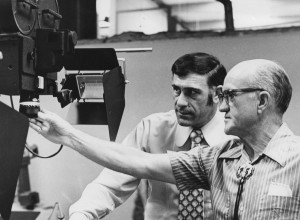 expand the agency division, was given permission and I took on board quite a number of associated film, film-laboratory and audio-visual products, mostly of American manufacture. Some of my customers then became TV stations at each of which throughout the UK I met old workmates from the BBC who had moved on to pastures new.
expand the agency division, was given permission and I took on board quite a number of associated film, film-laboratory and audio-visual products, mostly of American manufacture. Some of my customers then became TV stations at each of which throughout the UK I met old workmates from the BBC who had moved on to pastures new.
After ten years I resigned from Vinten to take up a position as Sales and Marketing Manager for a company based in Staines, Middlesex. They manufactured precision motion-picture printers and animation stands and I brought some of my agency products with me.
My ten years with that company had me travelling all over the world a number of times and I considered myself very lucky to visit so many fascinating places I would otherwise never have seen and what is more at no cost and some comfort to myself. I also introduced myself to their existing overseas agents and appointed new ones where necessary to include the new products and continued to organise exhibitions.
Eventually television and video technologies started to overtake motion-picture technology and the move was now towards electronic media resulting in my being made redundant but I had a plan. I would revert back to my first love of television. I acquired a few bits of necessary equipment, cameras, lighting, audio and editing and started my own small production company working from home and that is where I am at still. I was lucky enough to become reasonably successful at the start and earn enough to keep body and soul, wife and children and the mortgage together added to which I started freelancing again and this provided a welcome boost to my income. I have now got to the age where I enjoy working in the editing suite and doing conversions and disk production and the like but am decidedly picky about the type of shoots I accept that might involve anything too strenuous like climbing up mountains with heavy cameras and cables in the snow….yes I did that…. or travelling great distances without adequate compensation.
I have also done quite a lot of teaching video techniques in various media colleges and theatre schools, including the NFTS in Beaconsfield. Most colleges churn out hundreds of inexperienced and often ill-advised “wannabe’s” who will labour at anything for nothing just to get some experience in this ‘glamour’ industry. The guys and girls that do make a living are very fortunate and of necessity very talented compared to the many hundreds who finish up shelf-stacking in Woolworth’s……yes I know Woolworth’s doesn’t exist any more so you get my point. I am in the happy position of saying “I don’t work nor use my experience, expensive equipment and insurance coverage for nothing” but most indi producers and some of the stations these days just want everything for free or grudgingly with expenses-only covered. I am afraid the results often show on the screen but does the average viewer realise? Pay the crew peanuts and you get monkey operators
As a matter of fact Woolworth’s does still exist but in name only. In Australia, maybe elsewhere too, it is a chain of food supermarkets but in no way connected to the original 3d and 6d store of yore. I guess they just bought the name.
Here endeth the first lesson. So many memories of so many people I have worked with, liked (many) and disliked (a few) over these many years. If any of those reading this and still with us recognise my name and wish to get in touch I would be delighted to resume acquaintance and chew the fat.
PREFACE.
Once upon a time I read somewhere that if you start a story “Once upon a time” it has to have a happy ending. I’ve no idea if this is true and as I haven’t written this story yet I have no idea how it will end. So please come along with me and see where we get to.
CHAPTER 1
And so it came to pass that in the year of our Lord one thousand nine hundred and thirty two, in the Lodge at Handsworth Wood Cemetery, a baby boy was born to Florence & Richard Leighton.
You may well ask what is the relevance of the Cemetery – none really, it is just that my Father was Superintendent Registrar and the house was a perk of the job along with the occasional bottle of Scotch from grateful undertakers.Perhaps because my Mother liked Indian food (long before it became fashionable) I was named Clive. A name I have grown to like over the years.
Growing up in a cemetery was peaceful, the residents were all quiet and gave no trouble. I remember that we had fish & chips delivered every Friday lunch time, properly packaged in newspaper. A delicacy that I love to this day, particularly if it is Huss (Rock Salmon to the uninitiated).
When I was 5, my Father became Superintendent at the rather up-market Cemetery and Crematorium called Putney Vale near Roehampton in SW London. The residents there included Vesta Tilley, Howard Carter (Egyptologist), Kenelm Lee Guiness of KLG sparking plugs – in a plot overlooking his factory – and many more famous people.
The dark days of war came along. We were on holiday in Bognor Regis and I remember listening to the declaration of war in our B&B. Later my very worried parents took me to the high ground in Hastings and we could hear the guns from across the Channel. Back at home there was an Anderson shelter in the back garden and a quickly erected mortuary adjacent to the cemetery for the casualties of the expected bombing raids. This was quite fascinating to a 6 year old who watched proceedings from under a toy tin hat. After raids I would cycle around the Cemetery (before opening time) looking for nose cones from the AA shells. I had quite a nice collection until a cousin, who must have been around 9 at the time, thought I was ghoulish and threw them away. I have never forgiven him for this vandalism.
Wimbledon Common was adjacent to the Cemetery and many a happy hour was spent either wandering around exploring, and in the winter snow tobogganing down the steep slopes. Even more exciting was watching the soldiers trying to make log bridges on Queensmere lake. This usually ended up with the thing falling apart and the lads ending up in the water.
Further up the road was another lake, Kingsmere. In the summer I sailed my model yacht there and in the winter there was skating on the frozen lake. The Fire Service trained there. The firemen were blindfolded to simulate the blackout, and had to operate the pumps by touch, drawing water from the lake and drenching the unwary onlookers. And so I grew up watching the doodle bugs crossing the sky muttering, as I’m sure every one did, “keep going!” We were lucky, only had the windows blown in twice and a nasty smelly oil bomb in front of the house.
My poor Father was frequently called out by the police during the night, as lights had been seen in the Cemetery. The thought was that German spies were trying to access the KLG sparking plug factory adjacent to the Cemetery, perhaps with a view to sabotage as the plugs were for aircraft. Can’t imagine any saboteur walking around in the black out waving a torch around. Any way nothing was ever found, but it was exciting at the time. Eventually I found myself in grammar school where the staff were mainly retired teachers who tried their best to get us up to School Certificate standard. Not the happiest time of my life. I was glad to escape as soon as I could and went to work for the Ministry of Works at Hampton Court Palace. I also became involved with the local Operatic & Dramatic society. A most enjoyable time and I eventually ended up as stage manager! After a couple of years I received an invitation from the King to join the armed services for National Service.
CHAPTER 2.
The thought of 2 years in the Army was depressing, so taking advice from friends I volunteered for 3 years in the RAF. Not only was the pay better but I got to choose a trade. Looking at the list of trades, photography, radio & radar paid rather well. I was selected for training as an Air Wireless Mechanic. After 6 months training at RAF 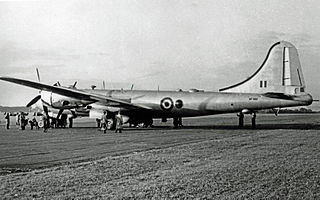 Yatesbury, I was fully qualified to work on any British aircraft. I was therefore posted to work on American B29’s (Superfortress) at RAF Marham in darkest Norfolk. At this time (1951 /52) the airfield was shared with our American cousins who took care of security with many machine gun and AA gun emplacements. There were armed guards with live ammo. Even the stores had two guards with loaded carbines outside. I really have no idea why they were there as the store keeper gave you anything you wanted.
Yatesbury, I was fully qualified to work on any British aircraft. I was therefore posted to work on American B29’s (Superfortress) at RAF Marham in darkest Norfolk. At this time (1951 /52) the airfield was shared with our American cousins who took care of security with many machine gun and AA gun emplacements. There were armed guards with live ammo. Even the stores had two guards with loaded carbines outside. I really have no idea why they were there as the store keeper gave you anything you wanted.
At night, if challenged, it was wise to hit the ground before replying. We British, who guarded our squadrons of Superforts, were issued with a dodgy torch and a chair leg on a piece of string. We never lost an aircraft, but our cousins had a depressing record of shooting at anything that moved resulting in the loss of several police dogs.
The terrible East Coast floods had the whole camp mobilised and were sent to fill sandbags 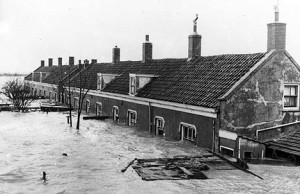 or give other help. We put an aircraft VHF and MF Tx/Rx into a signals wagon.
or give other help. We put an aircraft VHF and MF Tx/Rx into a signals wagon.
The radios were powered by a huge Superfort ground power unit towed behind the signals wagon, and we were able to liaise with HQ at Marham. When the emergency was over all weekend leave was cancelled because one shovel had been lost!!!
CHAPTER 3
Demob time……An old school friend had joined the Beeb and told me that “they” looked on ex RAF people favourably. So I applied and was given an appointment for an interview in Birmingham. I wrote and explained that to get from Kings Lynn to Birmingham I would have to go via London, so could an interview be arranged in London. I received a lovely reply giving me the train times to get me to the interview as arranged in Birmingham, The only problem was that these trains had not run since the war! Anyway I made my way to BM and duly had a very pleasant interview. I was asked my preference for departments. I gave Tel OB’s then Tel studios, Radio OB’s or Radio studios. After the interview, the SRE at Birmingham was standing by to rush me to the station to catch the non existent train back to Kings Lynn. A tiring but pleasant day.
Some weeks later I received an invitation to join Transmitter Department at Bartley, near Southampton. So much for my choices! Bartley was a 10kW medium wave transmitter radiating Basic A or Home service. There was a 2kW stand by transmitter powered by an antique Lister Diesel. Bartley also had remote control of low power TX at Brighton, Bexhill & Folkestone. Life there was pleasant. I had the use of the station bicycle which enabled me to see a bit of the New Forest. I learnt many useful things, e.g. how to boil 5 gallons of oil to top up capacitors and transformers, Megger the carboys of distilled water and how to climb into the roof space to top up the telephone batteries. Not to mention cleaning double enders!
I soon realised that the transmitter engineers were a very learned lot doing City & Guilds 5 or something incredibly clever. There was, I felt, little hope that I could match this to progress to grade C- so I applied to transfer to London studios. That is how I came to BH Control Room, which at that time was in the dungeons of BH. I had to learn the way in which programmes were distributed.The work was varied, one day checking every mic & mic point in every studio. Each gram deck was checked. The Teddy Bears Picnic was the record for the 78 decks & Peter & theWolf for the few LP decks. There were lots of double enders to be cleaned, especially the grey ones reserved for Grade 1 broadcasts.
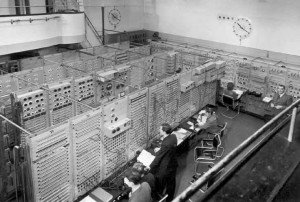 The programme routing was carried out in 3 main positions, Incomings, Outgoings & SB (Simultaneous Broadcast) On the balcony was OB’s. There was a row of bays which handled the routine connection of studios or external sources to recording channels etc. Control Room staff also operated the 3 Continuity suites, Home, Light and Third programmes. Eventually I was allowed to operate Third continuity as a meal relief. I enjoyed my time in Control Room but after a couple of years I heard that people were rushing from Lime Grove to join the ITV lot. Once again I applied for a transfer to TV. The EiC London station warned me against such a move as ITV would be a failure. If I stayed in the Control Room, one day I might reach C minus!! They must have been hard up as a transfer was granted very quickly and I soon found myself at Lime Grove.
The programme routing was carried out in 3 main positions, Incomings, Outgoings & SB (Simultaneous Broadcast) On the balcony was OB’s. There was a row of bays which handled the routine connection of studios or external sources to recording channels etc. Control Room staff also operated the 3 Continuity suites, Home, Light and Third programmes. Eventually I was allowed to operate Third continuity as a meal relief. I enjoyed my time in Control Room but after a couple of years I heard that people were rushing from Lime Grove to join the ITV lot. Once again I applied for a transfer to TV. The EiC London station warned me against such a move as ITV would be a failure. If I stayed in the Control Room, one day I might reach C minus!! They must have been hard up as a transfer was granted very quickly and I soon found myself at Lime Grove.
A spell in valve & camera tube stores convinced me that this was not for me. Then to film recording. Now that I thoroughly enjoyed and managed to stay there. I loved the smell & feel of film. (Not to mention the short ends!!) Exciting times recording sound & pictures on HP3! Also the 16mm recording from a commercial tv with added spot wobble not to mention the terrible variable density sound. This was later replaced by a Marconi Quick Pull Down situated in a large tin booth in the recording area. By chance I recorded the original rehearsals of the Queens Christmas speech which were duly sent for Royal approval.
This was originally an Engineering department but was made into an operational one. I went to Wood Norton to do the C ops course when we heard that Recording was going to revert to Engineering. I requested a transfer to the Engineering C- course but were assured that there was absolutely no intention of changing back to Engineering so stayed with the ops course. Having passed the course and returned to Recording we were told that we were all out of a job as the department was going back to Engineering!
CHAPTER 4.
So what then, find another job. We were told that we could choose any department we
liked, I asked for film unit. Had an interview for a trainee film cameraman but was
rightly beaten by Butch Calderwood. We were at Wood Norton together on a course
and he was always flashing his Bolex.
I was now told that I would have to go to TV studios. At long last!! As a raw recruit I
was given the opportunity to try my hand at various things. I was not allowed on a
boom after I nearly brained Valerie Singleton on Blue Peter. Cameras – reading a crib
card and trying to select the correct lens, point the camera in vaguely the right
direction and focus all the same time was another skill that eluded me. I have the
greatest respect for those that have this skill. 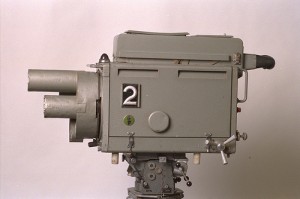 Vision control, CPS cameras & IO’s. Hands in CCU’s. This suited me. A wonderful time with a whole range of exciting live shows. B&W Minstrels, Billy Cotton BandShow, Crackerjack, Big Band shows, Pet Clark… I could go on – you name it we didit. The best job in the world. Didn’t dare to think of ten million plus people watching live shows!
Vision control, CPS cameras & IO’s. Hands in CCU’s. This suited me. A wonderful time with a whole range of exciting live shows. B&W Minstrels, Billy Cotton BandShow, Crackerjack, Big Band shows, Pet Clark… I could go on – you name it we didit. The best job in the world. Didn’t dare to think of ten million plus people watching live shows!
I probably turned John Summers hair gray when we were doing a live music show
with many lighting cross fades. I used “Rem Dim” with a stage weight on the floor
button. Bet they don’t do that anymore!
CHAPTER 5.
Colour came & I was lucky to be turned into a TM2. Even lit quite a few shows. Lots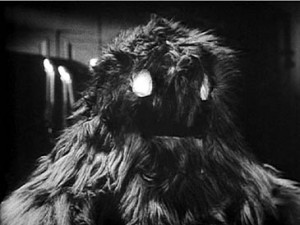
of Children’s programmes, Blue Peter, Playaway etc. The high spot was when Geoff
Shaw let me light a Dr Who, TheWeb of Fear.
TheTM’s office was conveniently situated next to the tea bar. To start the day there
was nothing better than a coffee and one of Jackie’s sausage rolls heated to greasy
perfection on top of the hot water boiler. Unfortunately, the health police eventually
stopped this and breakfast was never the same again.
My first solo as aTM2 was in TC1. Not Only But Also. Pete & Dud. A whole string
of the very best comedy & music shows followed, most of which I have forgotten.
How I wish I had kept my diaries.
Time passed, TM’s were turned into TC’s and I had to say goodbye to lighting.
Never mind, Plenty of wonderful shows. Lots of children’s programs. Lots of TOTP,
outside rehearsal & snacks with Flick and Pans People. Cant get much luckier than
that!
I well remember a planning meeting with Walter Todds at Ken House. During the
meeting I noticed smoke coming from Geoff Shaw’s jacket pocket. His slumbering
pipe had set fire to his jacket. Geoff quickly put out the fire but not before the office
was a bit smoky. A window was opened and a gale blew in, quickly clearing all the
desks of paper. Luckily the fire alarms and sprinklers did not go off.
I had to spend a few weeks lighting the OU productions at AP. A very relaxing time.
I caused a bit of a stir when I asked the sparks to rig a couple of Pattern 23’s with holes
poked in tin foil. The intention was to break up a boring plain backing. Cue the
director who arrived and threw a wobbly! Never been done before…distracting…. not
suitable for an educational programme etc. I explained that as the programme was
being film recorded, the broken up background would minimize the inherent noise in
the system. Rehearsal was delayed while the suits withdrew to hold a meeting! Eventually thisrevolutionary idea was reluctantly accepted.
A thoroughly enjoyable spell at the Greenwood. Superb food in the canteen, and a
great selection of shows. Russell Harty, Parkinson, Question Time and Friday Night Saturday Morning.
A bomb scare and we had to evacuate the place. A rather large Sergeant of Police
offered me the opportunity of searching the place. (He explained that he did not know
the lay out of the theatre, I explained that I didn’t know what a bomb looked like. He
said that neither did he!) So I persuaded a couple of “Volunteers” to help but luckily
we found nothing.
Then there was the day when we lost the vision circuit to TVC just before a
recording. It eventually turned out that a Post Office Engineer in a repeater station
turned off ALL the power as he was going home. Poor audience left not knowing
what was happening. (Neither did we!) Bill Poole arrived and we rang just about every TV organisation we could think of to try and get a mobile VT unit to come over, but none to be had. Eventually power was restored and all went well.
CHAPTER 6 and last!
Time passed and I sort of volunteered for sport. This was, at times, a 7 day a week
job with very long hours. It was a good team. Paul Mason, John Carter, Tony Bate,
Rod Litherland & Ken Morris. International sports, Commonwealth Games,
Olympics. Motor racing on a Sunday afternoon, gallery only. Murray Walker plus
guests. Cricket on BBC2.. You name it, the Beeb covered it. Exciting times in the
Gallery, not quite as noisy as in the Cowgill days but it had its moments!
I managed to get involved with a few Christmas specials, TOTP and Morecambe &
Wise. I was at the studio end of LiveAid and a Christmas day special with Noel Edmonds up the Post Office Tower.
All good things have to come to an end, One morning around 1am (Thursday) after a
late Sportsnight, as I was heading towards reception to hand the key in, when it really
hit me that I had to be back at 9am to get ready for a Grandstand planning meeting.
Following this a live sport transmissions on Friday, Saturday and Sunday. Maybe a
day off on Monday and then another 6 days with live shows. Enough, I said to myself
as I leaned on the wall to guide me to the lift. There has to be a life outside the TVC.
Too many friends had fallen off their perches.
So I set in motion a request to take early retirement. All too quickly it was time to
visit B207 to have a last glass or two. A very sad day. Nice things were said to me and
I mumbled some sort of reply fearing a bleak future for everybody at TVC. Luckily I
had Jeanette to support me (no, I didn’t have that much to drink) It was a very sad
and quiet journey home. It appears that I got out just in time, the good days were over.
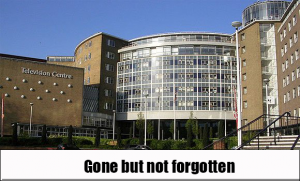 Gradually I noted that familiar names were no longer on the credits. Now you can’t even read the credits!
Gradually I noted that familiar names were no longer on the credits. Now you can’t even read the credits!
Time passed, aged parents to be looked after and eventually family who lived in
France persuaded us to make the move. So here we are in an old farm house in the
very rural Gers. We have been here for 10 years now. We have learned to live with
the down side – no Indian restaurants or fish & chips but the peace and quiet make up
for a lot.
So many people I would like to thank for their time and advice so freely given. Many
of them no longer with us, but I expect they are looking down and complaining about
lip sync, intrusive music and lousy presentatition. I hope that, in my turn, I managed to
pass on a few tips to the next generation of TCs. I was paired with Geoff Shaw for a long time and it was because he attracted such a wide range of shows that I learned so much. Thanks Geoff. Dave Jervis put up with me pushing him to create effects for Johnnie Stewart & TOTP. What a contrast to Peter Coe & Roger Davis with their mechanical wipes!
So hear endeth the story, so many memories and stories scattered around, still untold.
Is it a happy ending?Yes it is, I think I have had a very interesting and lucky life.
Perhaps I was right in starting with “Once Upon aTime”
{If there are any errors in this story please put it down to old age and keep quiet
about it! Cheers, Clive.}
Paul Ewing has kindly given me some pages of BBC Engineering Information Dept material explaining Test Card C. I know that out in the world there used to be a whole cult (is that the right word?) of test card appreciators. They’d write to Presentation asking about the music, and of course, to EID about the vision……
I have to say, though, that the bit I like best is this next – a compliments slip from EID. The first communication I ever received from the BBC was a copy of Technical Careers in the Engineering Division, and it came with one of these. I still have it somewhere.
Roger Bunce has been looking after this Christmas card from the Production Design department since the early nineties. It was the very end of the era of the confident BBC culture at Television Centre, when the BBC was still (almost) a big family, and departments had fun.
The mural on the end of the Spur was created by Going Live, after complaints that the building looked like an ever-unfinished building site. The mural went away when the end of the spur running down to the road was built. It seems like they only just got the place completed when they didn’t want it any more….
There’s a very large version of the Television Centre picture here
+++++++++++++++++++++
If you haven’t seen This is the BBC, find it on YouTube under APTS Archive. A long time back, Roger sent some stills from the film, and has done some higher resolution updates……..